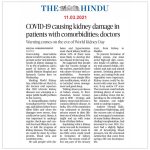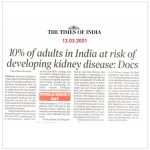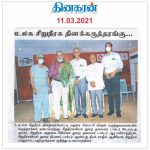The warning comes on the eve of world kidney day
Overcoming reservations about the Covid-19 vaccine is important as the viral infection results in kidney damage in 7% to 15% of patients said a panel of doctors at Meenakshi Mission Hospital and Research Centre here on Wednesday.
Marking world kidney day, which falls on March 11, the doctors told reporters that CKD (chronic kidney disease) was emerging as a major public health problem in the country.
Dr. K. Sampathkumar, Senior Consultant & HOD – Nephrology, said kidney failure is a silent killer and when the damages are severe, they cannot be cured and control food to delay or halt the progression of kidney diseases. The diagnosis can be done by urine protein, blood urea, and creatinine tests.
He said that people who have diabetes and hypertension must check kidney health without fail as about 30% of them are most likely to develop kidney disease in the long run. He suggested that people take the vaccine dosage at the earliest, especially those who are above 45 years with comorbidities. Preventive measures are simple lifestyle modifications, which also include stress management and good sleep.
Talking about the prevalence of kidney stones, Dr. R. Ravichandran, Senior Consultant & HOD – Urology, said kidney stones have become a common lifestyle disease. In India, 12% of the population is estimated to develop urinary stones in their lifetime – out of whom about 50% may end up with some form of kidney failure.
Explaining what a kidney stone is and its treatment, he said too much waste in too little urine it can result in the formation of kidney stones. These stones can affect any part of the urinary tract, from kidneys to bladder. To prevent the formation of kidney stones, one must avoid a high-salt diet, excessive intake of caffeine, sugary, and aerated drinks, chocolates and nuts, and animal protein. Drinking plenty of water, and having fruits and vegetables are important. Kidney stones can be detected with a urine test, blood test, X-ray, and or CT scan. The treatment may include drinking plenty of water to pass a kidney stone. But depending on the criticality of the situation, one may need to undergo surgery.
Dr. Andrew Deepak Rajiv, Consultant – Nephrology, the success rate of surgical and nonsurgical treatments of many kidney diseases – including transplantation, had increased to over 90%. Donors had a slightly higher risk of developing blood pressure, but the emotional satisfaction that came from saving a life was incomparable.
Source: The Hindu
Date: 11:03:2021











